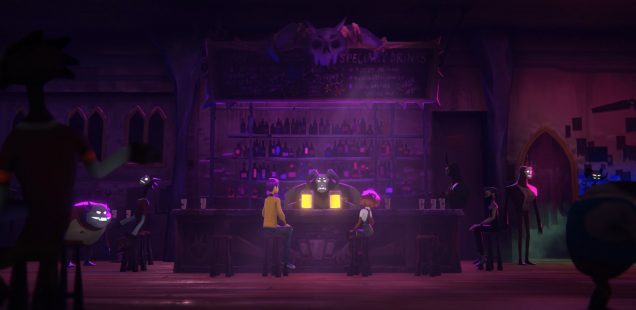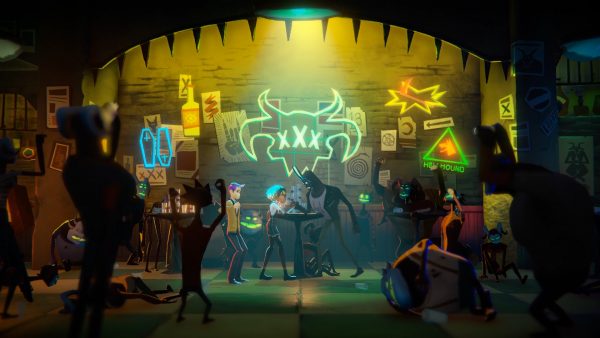
Afterparty and the Tedium of Eternal Consumption
Bartłomiej Musajew #goestohell.
“The point is people have always drunk to excess – drunk to compete in excess,” a character in Night School Studio’s latest game, Afterparty (2019), says of drinking contests. She then mentions Medieval Europe, where, according to her account, they flourished among serfs “dreaming of being a lord fat in fame and leisure,” and desperate to escape the dreary reality of back-breaking labor and bill collectors. This vacillation between the persistence of drinking contests, allegedly “as old as simians,” throughout the ages and the specificity of feudal Europe makes it hard to shake off the impression that she is unwittingly describing a more contemporary issue by both universalizing it and displacing it to a distant time. What is really being talked about is another kind of thirst – a thirst for consumer goods. After all, the main problem discussed by this character is not the need to drink away one’s misery, but rather the invasion of the serfs’ private dreams by the same lords who own their work. Just like the images of movie stars, politicians, and fashion models today, the memories of the lord’s fat belly and opulent manor glimpsed while working the field define the limits of the peasants’ imagination. Their only way of approximating these dreams is to imitate the fabled life of the lord by enacting a ritual of unrestrained drinking. As the lord gets in this way to possess the serf’s mind, leisure itself becomes only a mirror image of labor, organized on the same principles of competition and excess. The name of the game is to outdo others both in production (or, speaking in contemporary terms, in job performance) and in consumption in order to achieve, for a fleeting moment, a kind of imaginary respect and well-being – ideal values implanted in people’s minds by the same powers that make these ideals impossible to reach. This consumption leads to the accumulation of debt that perpetuates the never-ending cycle of labor and escapist leisure (to forget the bill collector). The literal flow of alcohol in this case is a parable of the flow of capital and the unending flow of goods and images, through which capitalism can appropriate not only the time but, above all, the identity and the very sense of self of an individual.
Liquidity, which implies shapelessness and a tendency to constant motion like that of a liquid’s molecules, is also the metaphor used by Zygmunt Bauman (see for instance Liquid Modernity, first published in 2000) to describe the condition of contemporary society under the domination of multinational capitalism, defined by a globalized flow of capital and information, as opposed to the previous, more solid, stage of capitalism when capital assumed the stable spatial form of a factory complex producing palpable goods, rooting workers to particular spots on the production line, but also providing stable employment. What is more important in this case, however, are not the economic processes themselves, but their impact on society. The main characteristics of life in what Bauman calls liquid modernity are individualization and the fluid nature of identity. Liquidity means that an individual cannot assume a predetermined role that would define their place for the entirety of their life; on the contrary, identity turns into a private matter, subject to disintegration and constant flux. The question is, if not an inherited position or even profession, because of the precarious nature of the job market requiring constant flexibility, what can be used to construct an imaginary sense of identity? One of the answers: consumer goods and services. Individuals are defined by what they consume. The question of identity becomes the question of lifestyles: a person is identified by what clothes they wear, what cars they drive, what food they eat, what music they listen to, what films they watch, what magazines they read to get their opinions. This leads to the fragmentation of self and a feeling of constant instability, as identity is not anchored to a solid foundation, but attached to free-floating commodities, which constantly become obsolete, requiring continual change. What results from this fluidity and individualization is the impossibility of communication between citizens and political action on a global scale. Experience is privatized, and individuals are held personally responsible for all their problems, even ones they cannot possibly fix on their own. For instance, issues determined by socioeconomic factors (you cannot find a good job because there are no good jobs available or you are too poor to afford education) are put down to psychological causes (you cannot find a good job because you lack confidence, you are not motivated enough, you suffer from neuroses). And then there is a whole market for dealing with these psychological causes, from different kinds of psychotherapy through self-help books to the wellness industry. Even an individual’s own psyche and body become commodified and sold back to them.

After this detour in discussing the sociological metaphor of liquidity, let us return to the world of Afterparty. The game is set in Hell; not, however, in the Nine Circles, described as “the, uh, conurbation where everyone gets tortured during punch in,” but on Nowhere, an infinite chain of islands connected by the River Styx, where demons and dead humans spend their time off. Although the river is said to be immaterial, it is represented as magma, and the game in general abounds in images of and references to liquids: from green, probably toxic, sludge through bodily fluids to the omnipresent alcohol. Paradoxically, even though the world of the game is organized like a modern corporation and dominated by corporate jargon and ideology, one of the characters says that the use of money was discontinued because the inhabitants of Hell realized that they “don’t really have an economy down here.” Capitalism not only determines the way everybody thinks and speaks but also invades their imagination through alcohol, and deforms their bodies through torture. It appropriates an individual on every level, including the physiological. However, the actual rules of its functioning cannot be understood: nobody in Hell can fathom the system governing their world, let alone change it. Hell’s inhabitants cannot even describe the place they occupy, as evidenced by the “uh” in the statement quoted above (as if every word choice was only approximate), the description of Styx as immaterial, the name Nowhere, and the disuse of money, which used to circulate by habit and not as a part of a coherent economic system. Experience in Hell is purely private, reduced to a flow of impressions and bodily sensations that elude reason and language. That is why capitalism in this game is associated with God, the absent law-giver whose laws seem to be in constant flux, and can be neither comprehended nor questioned.
We explore Hell as Milo and Lola, newcomers who have one night to defeat Satan in a drinking contest and return to the world of the living in order to avoid condemnation to eternal torture. Their experience of the afterlife is determined by the forgetting of their previous lives, which deprives them of an identity established through memory – that is, through continuity – and opens them up to the flow of fragmentary experiences on Nowhere. Nowhere is liquid not only in a literal sense, as a chain of islands, but also metaphorically as a place where it is impossible to put down roots. It is a place for eternal nomads drifting from one nightclub to another before “punch in” at their workplace. The several islands where the game is set are collages of fragments that fail to cohere. It is often impossible to determine what function particular structures serve or used to serve. For instance, whether this crumbling wall or that collapsed stone staircase are ruins of some old edifices, parts of demolished new buildings, or imitations of ruins built to provide authenticity. At one point in the game, a character says that repurposing a church into a rehab clinic is as easy as set-dressing Toronto to look like New York, and another compares Hell to London, which suggests that Hell is a set built from interchangeable fragments that can be shuffled at will, just like skyscrapers and prefabricated houses imitating various architectural styles that can go wherever capital goes in modern cities.

The process of forgetting and the fragmentation of space are accompanied by the dissolution of language. Since the inhabitants cannot conceptualize the world they live in, they cannot talk about it rationally; discussion leading to change is out of the question. When Milo asks Satan about the cause of his and Lola’s banishment to Hell, Satan responds with an irrelevant and barely coherent anecdote. The rules of the place are not known even to the ruler. In the face of this impossibility of a socialized communication process, the characters are left with various kinds of private, solipsistic languages. Firstly, they can focus on their bodies and talk about body parts, fluids, and processes, often in grotesque combinations – a mirror image of the contemporary obsession with fitness and health. For lack of a stable identity, the body is reduced to its pure, formless materiality, and becomes alien, fragmented – just like the chain of islands reduced to oppressive heat and the flow of magma and sludge – and has to be constantly shaped and reshaped. Second, they can launch into a nonsensical and ungrammatical stream of insults, as often happens on Bicker, the Infernal counterpart of Twitter. Sometimes this disintegration of speech goes so far as to assume the form of animal sounds, like barking. Finally, they can resort to cultural or historical references. The function of references, apart from providing satisfaction to those who can get them, is often to imbue a given text with an aura of authenticity. For instance, when a non-American player hears a reference to Grover’s Corner or South Bend, they can gain pleasure from dealing with what they think is a genuine American experience, even when they don’t know what the name actually refers to. Such allusions in popular culture often do not communicate much. They are like imitation ruins – they provide a sensation, an aura, cheap gratification; they are fragments that exist for tourists. Afterparty consciously uses this fact by saturating sentences, almost to the point of absurdity, with references not only to American culture and history, like the ones mentioned above, but also to the Bible, to mythology, to European literature, to Roman history, even to prehistorical phenomena, thus inhibiting communication by ensuring that few players will actually be able to understand all the allusions.
Obviously, a dialogue-driven game cannot be based entirely on this kind of incoherence. The language of the game is strongly stylized and fragmented, functioning like merchandise, a set of unconnected styles taken from popular culture that can be used to create an imitation of identity, for instance, of an ironist who sees through it all, a socially awkward introvert, or a superficially friendly corporate executive. All language becomes just an affectation masking the fact that the speaker has nothing to communicate. In this game, this process is explicitly satirized by allowing the player to literally buy styles incongruous with the setting – such as a mobster, a witty vaudevillian, a pirate – along with particular drinks. I’d like to focus, however, on one language – the language of popular psychology, embodied by the figure of a personal demon, who at several points in the game criticizes the protagonists’ flaws and brings back painful memories of family conflicts. Significantly, personal demon is an official job title. Personal demons thus epitomize the way capitalism employs popular psychology to determine how individuals construe their inner selves, making them focus on their private experiences instead of trying to collectively determine their socioeconomic situation through a rational, politicized process. One of the subplots in the game actually concerns a rumored coup against Satan which turns out to be a purely familial matter: Satan’s siblings hire a professional interventionist to help their brother with his drinking problem, turning a potentially political act into a private affair. But then, even a coup would be an action on a local level that would not affect the global rules dictated by the capitalist God.

By way of conclusion, I’d like to point out that Afterparty touches on a problem pertinent in videogames as a form of popular entertainment. Games haven’t yet figured out how to talk critically and directly about life in contemporary society without reducing it to a plot about private experiences, often revolving around familial and family-like relations, or, using a phrase appropriated by managerial jargon, around interpersonal dynamics; capitalizing on current issues by turning them into simplified empowerment, survival, or oppression narratives; transforming various political, social, and cultural processes into fragments, building blocks used to construct fictional worlds that don’t have much to do with our own; and, finally, thematizing the impossibility of communication and political change without providing an alternative, like Afterparty. Or, to cite one more recent example, Disco Elysium (2019), a game set in an island city gutted by years of colonialism, a failed revolution, and, finally, the unrestrained flow of capital. We navigate this dismal place as a detective suffering from an alcohol-induced amnesia, whose mouth we can use to spout communist or ultraliberal slogans, all equally meaningless, at corrupt union bosses and real estate developers. And yes, at the end of the day the story boils down to addiction, traumatic experiences, and broken hearts.
Bartłomiej Musajew is a PhD student interested in literature and videogames. He lives in Warsaw, Poland.